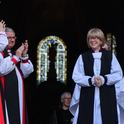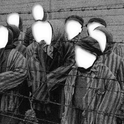How far back do you want to go? I can remember being taught to pray as soon as I learned to speak. When I was five, Rabbi Martin laid his clean, pink hands on my head and blessed me. He blessed every child in the class, so that we would each feel special.
The memory stuck with me, so now when parents bring their children up to the altar rail, I try to make it special. I take my time, praying that they’ll know God’s love and grow into the gifts God has given them: wisdom, truth, courage and more. I pray that they’ll be protected on their adventures. What I don’t do anymore is lay my hands on their heads.
In this anecdote you can glimpse the way safeguarding has become part of our life in the parish. The cultural apparatus includes criminal record checks for staff and volunteers, posters in and around the churches, a link to the parishes’ safeguarding commitment statement on the homepage of every website, and the vigilant presence of the benefice safeguarding officer. When I first arrived in Cambridgeshire, we’d go to Ely for our safeguarding courses. You could see how necessary they were, because there was always someone who’d grumble that girls of 12 looked 18 nowadays, and that a man couldn’t be expected to know the difference, or that some marriages were naturally like Punch-and-Judy shows and some women liked it that way.
The Church likes to refer to itself as “she”—a person, not an institution. But it’s an institution, all right
The courses are now rolled out online by the Church of England. They’re not as good, but a kindly friend who’s a magistrate explained that their real purpose was to make sure no one could claim ignorance. As you click from one scenario and set of simple questions to another you think, “I’m sure Ben Field would have cinched safeguarding.” That’s Ben Field the murderer, played by Éanna Hardwicke in The Sixth Commandment, Sarah Phelps’s dramatisation of the events in Maids Moreton. (Prospect’s own Sheila Hancock had a stellar role as larky centenarian Liz Zettl, the next mark on Field’s list of potential victims.)
Most of The Sixth Commandment was too harrowing for me to watch. That being said, I think it should be required viewing for the Church’s safeguarding courses and in theological colleges—and maybe even for the Archbishops’ Council. Let’s all be harrowed.
Yes, I know that every single faith is infected with the abuse of power: sexual abuse, spiritual abuse, bullying. So are the Scouts, the other uniformed organisations, the BBC and the world of organised sports, together with every other realm where people trust and submit themselves to others. Institutions that people persist in treating with the reverence that we owe to sentient beings. What’s so harrowing in The Sixth Commandment is the painstaking accuracy of the depiction of vulnerability and trust and the cruelty of its exploitation.
The Church doesn’t like thinking of itself as an institution. It’s the Body of Christ in the world, we say (and I say it too). It’s the Bride of Christ if you’re High and “the people, not the building” if you’re Low.
The Church is also Father Alan Griffin, who hanged himself after unsubstantiated malicious gossip in the Diocese of London turned into a safeguarding skip fire. It’s the late John Smyth, and those who suffered the sadism he dealt out in the name of Christ, and those who have ensured that the Church of England’s report on his abuses has still not been made public. It’s the young men at Soul Survivor, Watford who allege that they were oiled up and massaged and wrestled with and discarded and never spoken of again. It’s Peter Ball, and it’s the unfair treatment meted out to Martyn Percy and the late George Bell. It’s the wives with finger marks around their necks who believe that they must submit and forgive, and the husbands who are assured that they are the heads and rulers of their families. It’s the old lady in the hospital bed whose parents told her 80 years ago that she was a dirty, wicked liar to say that Father would ever touch her like that, and it’s the priest who blighted that little girl’s life. It’s the bishops wanting to do what’s right and feeling bound by the Church’s lawyers and insurers to do whatever will keep our rickety sinful show on the road a few years longer. It’s the survivors of abuse in the Church who’ve been instructed to tell their stories yet again, to someone new whom they have no reason to trust. It’s the Ben Fields of this world, and the Peter Farquhars.
The Church likes to refer to itself as “she”—a person, not an institution.
But it’s an institution, all right. For those of us who were told once that everything we did was to be done for the glory of God, it’s an institution whose shame we bear. And so, I’ve stopped laying my hands on the children who come up to be blessed, counting on a spark of the Holy Spirit to jump the gap between us.














